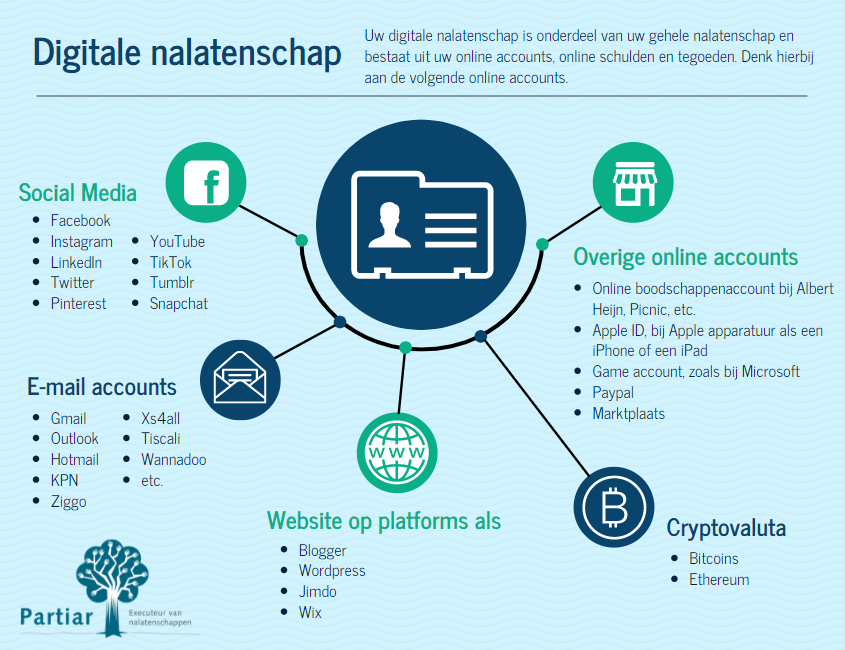What happens to your digital estate after your death?
We are increasingly online and findable online. Where 10 years ago we only had a few online accounts, Social Media accounts, e-mail accounts and other online accounts have become indispensable. But what happens to such an account if its user dies? Do you know what you leave behind online when you die? And what's more, do your next of kin know what to do with your digital estate after your death? In this article you can read more about what a digital inheritance entails and what you can arrange and record yourself.
What is a digital legacy?
An estate, also known as an inheritance, refers to all the assets and debts that you leave behind after your death. Think of your personal belongings, an owner-occupied home, household effects, subscriptions. This also includes your digital legacy. Your digital estate consists of your online accounts, online debts and credits.
When we think of an online account, we often only think of Social Media accounts such as Facebook or Twitter. It is quite possible that you have neither. But maybe you do have an email address with a Gmail account or Outlook? Or an online account at a webshop such as Bol.com or on Marktplaats. These accounts are also part of your digital estate and must be canceled when you are no longer there.

What should be done with your digital legacy?
After your death it is not self-evident that your online accounts and subscriptions are automatically canceled. After all, the organizations and companies are not aware of your death. Without notice, these accounts will continue to exist and may cause inconvenience in the future. The well-known example is with Facebook. Relatives can receive a notification from Facebook on your birthday to congratulate you. Or Facebook will propose retrospectives with photos. For some this can be a nice memory, for others a painful moment. It is therefore important that you determine what should be done with your digital estate after your death.
Cancel or keep?
As with all subscriptions and accounts, it is important that online accounts are canceled after a death. With only Facebook and Instagram you can determine whether your account should be converted into a so-called 'In Memoriam' page after death.
Have you created a fan page on Facebook and gained a lot of followers over the years? Then you could consider appointing someone else as co-administrator, so that the page can continue to exist after your death. The page is attached to your personal Facebook account, so when your Facebook profile is deleted, the fan page will no longer exist. The same goes with a business page on Facebook. This is also linked to your personal account. If this page should continue to exist, it is also important to appoint a co-administrator for this page.
How do you record your digital legacy?
First of all, it is important that you make an inventory of your online accounts. DELA has a very handy checklist that you can use for this. This gives you a handy overview of your online accounts and is a handy reference work for relatives. But online accounts are usually encrypted with a password. How do you ensure that the passwords are known to your next of kin? There are several options for this.


Registering passwords in your will
One of the options is to record your passwords in your will at the notary. Unfortunately, it sometimes happens that we forget our password and use the 'forgotten password' function. Passwords stored at the notary are no longer up-to-date.

Passwords with your will
Another way is to include your passwords and usernames with your own copy of your will at home. Here it is important that you check the list regularly when you have changed your passwords.

Passwords in a password manager
A password manager is a digital vault in which you store all your usernames and passwords. With a password manager, for example an app on your phone, you have saved all passwords and usernames. You can put all your passwords in a password manager on your phone and only share the password manager password with your spouse, family or your executor named in your will. It is important that they have access to your phone if it is encrypted with a code.

Mr. Hans den Braven
More information?
Would you like more information about preparing and settling your estate? Partiar likes to think along with you.


